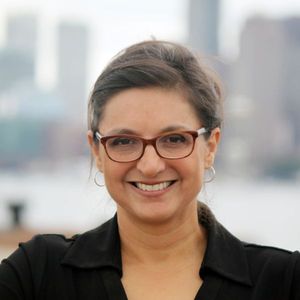Ana María Reyes Named Director of Center for Latin American Studies
Ana María Reyes, associate professor of Latin American art history was appointed as the new director of the Center for Latin American Studies (CLAS). She succeeds Pardee Master Lecturer Ambassador Paul Webster Hare who served as an interim director of the center from September 2023. Reyes will undertake her directorial duties on July 1, 2025.

“In assuming the directorship of the Center for Latin American Studies, Ana Maria Reyes takes over a regional studies center on the rise,” said Dean Scott Taylor. “Linked to Pardee’s only regional studies MA degree program (LASMA), and supported by the Maria Cristina Dos Santos De Souza Endowment made possible by a generous gift from Cristina De Souza and Tony Gomes, the Center for Latin American Studies has enormous potential. As a professor in the Department of History of Art and Architecture, Professor Reyes’ research and expertise exemplifies the relevance of the humanities to international affairs research and education. She has been actively involved with Pardee School for the past two years, and I am excited to see the growth of the center under her leadership.”
With a doctoral background in history of art and architecture, Reyes teaches specialized courses exploring Latin American art. Besides being part of the core faculty for the Latin American Studies program at Boston University, she is an affiliated researcher at the David Rockefeller Center for Latin American Studies at Harvard University and the founding member of the Symbolic Reparations Research Project.
Reyes is the author of the book The Politics of Taste: Beatriz González and Cold War Aesthetics (Duke University Press, 2019) which examines symbolic violence in the context of Cold War aesthetic and modernization discourses. Currently, she is working on her second book To Weave and Repair: Symbolic Reparations in Colombia’s Peace Process.
“As the United States confronts new political, economic, academic, and cultural challenges, the importance of studying Latin America has never been greater,” she said. “Rather than viewing Latin America through a lens of crisis, we should recognize it as a wellspring of innovative responses and solutions. The region’s experiences with transitional justice, whether moving from dictatorship to democracy or from civil conflict to peace, offer crucial lessons.”
Reyes believes that the strength and creativity of Latin America’s social movements can be an exemplar for meaningful change that mobilizes action while building “sustainable solutions through artistic, cultural, and community engagement.”
On her appointment as the new director of CLAS, she commented, “I am dedicated to supporting the outstanding research on the region already taking place at Boston University, enhancing the dynamic programming established by my predecessors, and expanding the center’s reach to build on CLAS’s already vibrant initiatives.”